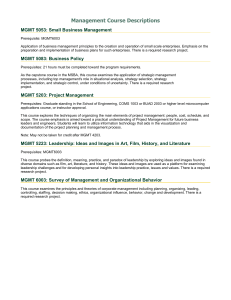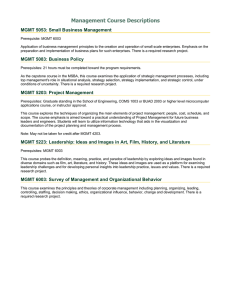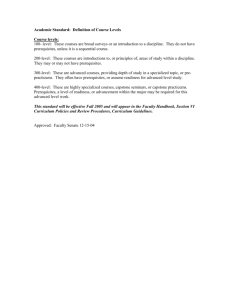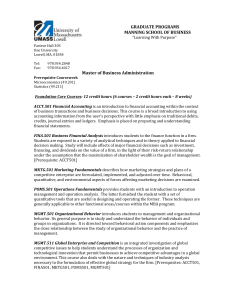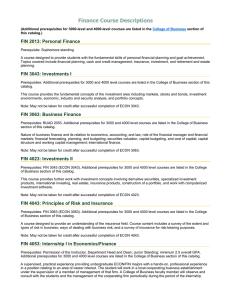Management Course Descriptions
advertisement
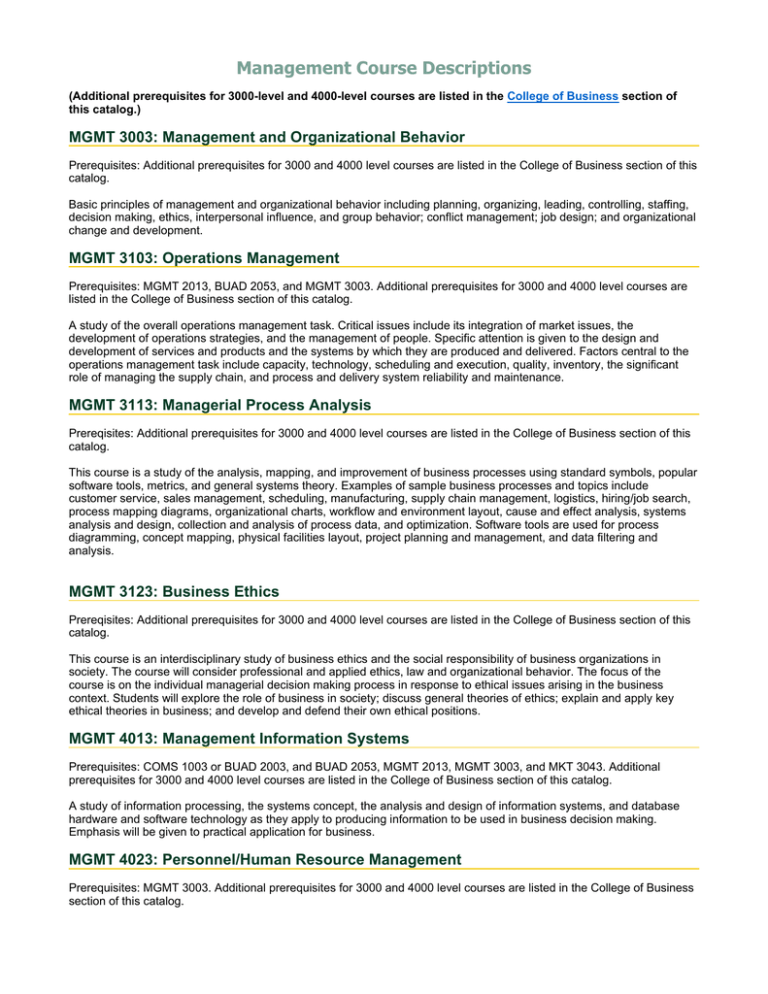
Management Course Descriptions (Additional prerequisites for 3000-level and 4000-level courses are listed in the College of Business section of this catalog.) MGMT 3003: Management and Organizational Behavior Prerequisites: Additional prerequisites for 3000 and 4000 level courses are listed in the College of Business section of this catalog. Basic principles of management and organizational behavior including planning, organizing, leading, controlling, staffing, decision making, ethics, interpersonal influence, and group behavior; conflict management; job design; and organizational change and development. MGMT 3103: Operations Management Prerequisites: MGMT 2013, BUAD 2053, and MGMT 3003. Additional prerequisites for 3000 and 4000 level courses are listed in the College of Business section of this catalog. A study of the overall operations management task. Critical issues include its integration of market issues, the development of operations strategies, and the management of people. Specific attention is given to the design and development of services and products and the systems by which they are produced and delivered. Factors central to the operations management task include capacity, technology, scheduling and execution, quality, inventory, the significant role of managing the supply chain, and process and delivery system reliability and maintenance. MGMT 3113: Managerial Process Analysis Prereqisites: Additional prerequisites for 3000 and 4000 level courses are listed in the College of Business section of this catalog. This course is a study of the analysis, mapping, and improvement of business processes using standard symbols, popular software tools, metrics, and general systems theory. Examples of sample business processes and topics include customer service, sales management, scheduling, manufacturing, supply chain management, logistics, hiring/job search, process mapping diagrams, organizational charts, workflow and environment layout, cause and effect analysis, systems analysis and design, collection and analysis of process data, and optimization. Software tools are used for process diagramming, concept mapping, physical facilities layout, project planning and management, and data filtering and analysis. MGMT 3123: Business Ethics Prereqisites: Additional prerequisites for 3000 and 4000 level courses are listed in the College of Business section of this catalog. This course is an interdisciplinary study of business ethics and the social responsibility of business organizations in society. The course will consider professional and applied ethics, law and organizational behavior. The focus of the course is on the individual managerial decision making process in response to ethical issues arising in the business context. Students will explore the role of business in society; discuss general theories of ethics; explain and apply key ethical theories in business; and develop and defend their own ethical positions. MGMT 4013: Management Information Systems Prerequisites: COMS 1003 or BUAD 2003, and BUAD 2053, MGMT 2013, MGMT 3003, and MKT 3043. Additional prerequisites for 3000 and 4000 level courses are listed in the College of Business section of this catalog. A study of information processing, the systems concept, the analysis and design of information systems, and database hardware and software technology as they apply to producing information to be used in business decision making. Emphasis will be given to practical application for business. MGMT 4023: Personnel/Human Resource Management Prerequisites: MGMT 3003. Additional prerequisites for 3000 and 4000 level courses are listed in the College of Business section of this catalog. A study of that function performed in organizations which facilitates the most effective use of people (employees) to achieve organizational and individual goals. Topics covered include the law and personnel/human resource management, personnel analysis, planning, and staffing; performance evaluation and compensation, training and developing of human resources; labor relations, employee safety and health; work scheduling; evaluation of personnel/ human resources management. MGMT 4033: Internship I in Management Prerequisites: Permission of the Instructor, Department Head and Dean; Junior Standing; minimum 2.5 overall GPA. Additional prerequisites for 3000 and 4000 level courses are listed in the College of Business section of this catalog. A supervised, practical experience providing undergraduate MGMK majors with a hands-on professional management/ marketing experience in a position relating to an area of career interest. The student will work in a local cooperating business establishment under the supervision of a member of management of that firm. A College of Business faculty member will observe and consult with the students and the management of the cooperating firm periodically during the period of the internship. Students will be required to make oral reports in the classroom, maintain an internship log, and prepare a final term paper. Note: Only three hours of internship may be used to satisfy the curriculum requirements for management or marketing electives. Additional hours may be used to satisfy the curriculum requirements for general electives. MGMT 4043: Internship II in Management Prerequisites: Internship I, permission of the Instructor, Department Head and Dean; Junior Standing; minimum 2.5 overall GPA. Additional prerequisites for 3000 and 4000 level courses are listed in the College of Business section of this catalog. To be taken after completion of Internship I. A supervised, practical experience providing undergraduate MGMK majors with a hands-on professional management/marketing experience in a position relating to an area of career interest. The student will work in a local cooperating business establishment under the supervision of a member of management of that firm. A College of Business faculty member will observe and consult with the students and the management of the cooperating firm periodically during the period of the internship. Students will be required to make oral reports in the classroom, maintain an internship log, and prepare a final term paper. Note: Only three hours of internship may be used to satisfy the curriculum requirements for management or marketing electives. Additional hours may be used to satisfy the curriculum requirements for general electives. MGMT 4053: Small Business Management Prerequisites: MGMT 3003, MKT 3043, and senior standing. Additional prerequisites for 3000 and 4000 level courses are listed in the College of Business section of this catalog. Application of business management principles to the creation and operation of small scale enterprises. Emphasis on the preparation and implementation of business plans for such enterprises. MGMT 4063: Entrepreneurial Development Prerequisites: Approval from instructor. Additional prerequisites for 3000 and 4000 level courses are listed in the College of Business section of this catalog. The course is designed to increase the students' understanding of critical entrepreneurial and venture creation concepts through practical applications and through textual readings. Specifically, students will take preliminary small business plans and develop and formalize plans that will be submitted for competition consideration at the annual Donald W. Reynolds Governor's Cup business plan competitions. MGMT 4073: Special Topics in Management Prerequisite: MGMT 3003. Additional prerequisites for 3000 and 4000 level courses are listed in the College of Business section of this catalog. In-depth exploration of selected management topics. The primary topic will vary from offering to offering; thus, the course may be taken more than once. MGMT 4083: Business Policy Prerequisites: Senior standing and completion of all junior-level College of Business core courses except for FIN 3063. Additional prerequisites for 3000 and 4000 level courses are listed in the College of Business section of this catalog. As the capstone course in the College of Business core, this course examines the application of strategic management processes, including top management's role in situational analysis, strategy selection, strategy implementation, and strategic control, under conditions of uncertainty. MGMT 4093: Human Behavior in Organizations Prerequisites: MGMT 3003. Additional prerequisites for 3000 and 4000 level courses are listed in the College of Business section of this catalog. A study of individual and group behavior in organizations. Topics covered include personality and individual differences, personal systems, values and ethics, perception, attribution theory, goal setting, reinforcement theory, theories of motivation and leadership, group systems, power and social influence, and organizational structure. MGMT 4113: Managerial Issues in Electronic Commerce Prerequisites: MGMT 3003, and MKT 3043. Additional prerequisites for 3000 and 4000 level courses are listed in the College of Business section of this catalog. A study of managerial issues and strategies involved in Internet-based buying and selling activities. The course examines appropriate business models and best practices in generating revenue, market share, and profit from wholesaling and retailing activities in business-to-consumer, business-to-business, and consumer-to-consumer venues. Topics include initiation and management of electronic commerce operations, technological infrastructure and tools, marketing, customer relationship management, electronic payment, security, staffing, social impacts, ethics, regulation, and international markets. MGMT 4203: Project Management Prerequisites: COMS 1003, BUAD 2053, MGMT 3003, MGMT 4013, MKT 3043, or instructor approval. Additional prerequisites for 3000 and 4000 level courses are listed in the College of Business section of this catalog. Project Management is studied from a practical perspective. In this course, students explore techniques of organizing the three main elements of project management: cost, schedule and scope, as well as how to manage the most important aspect of Project Management: PEOPLE. Students will learn to utilize software that aids in the visualization of the project management process. The emphasis of this special topic in management will be aimed toward an understanding of Project Management for future business leaders and engineers. The course will culminate with a month- long, graded, practical exercise with industry where students will be organized into teams or as individual developers and sent to explore all aspects of a problem, conduct a project initiation workshop, and then present a project management plan to the leadership of that participating industry. MGMT 4213: Business Leadership Prerequisites: MGMT 3003, MKT 3043, or instructor approval. Additional prerequisites for 3000 and 4000 level courses are listed in the College of Business section of this catalog. The course is an overview of the concepts and issues associated with contemporary leadership. It outlines the challenges, methods, and responsibilities of leading in our society. It covers what every informed citizen should know about leading in a variety of settings: the processes, styles, and pitfalls. We will address leader development, and discuss ethical issues related to leading. Guest speakers and student presentations will provide real world contemporary experiences for comparison to the text materials. Students are expected to be active participants in class. The final paper will serve as a roadmap for leadership development for each student for the next ten years. MGMT 4223: Leadership: Ideas and Images in Art, Film, History, and Literature Prerequisites: Junior standing or instructor permission. Additional prerequisites for 3000 and 4000 level courses are listed in the College of Business section of this catalog. This course probes the definition, meaning, practice, and paradox of leadership by exploring ideas and images found in diverse domains such as film, art, literature, and history. These ideas and images are used as a platform for examining leadership challenges and for developing personal insights into leadership practice, issues and values.
